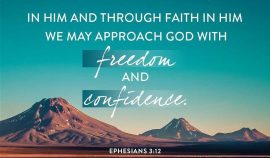
Psalm 16 New International Version – UK
Psalm 16
A miktam[a] of David.
1 Keep me safe, my God,
for in you I take refuge.
2 I say to the Lord, ‘You are my Lord;
apart from you I have no good thing.’
3 I say of the holy people who are in the land,
‘They are the noble ones in whom is all my delight.’
4 Those who run after other gods will suffer more and more.
I will not pour out libations of blood to such gods
or take up their names on my lips.
5 Lord, you alone are my portion and my cup;
you make my lot secure.
6 The boundary lines have fallen for me in pleasant places;
surely I have a delightful inheritance.
7 I will praise the Lord, who counsels me;
even at night my heart instructs me.
8 I keep my eyes always on the Lord.
With him at my right hand, I shall not be shaken.
9 Therefore my heart is glad and my tongue rejoices;
my body also will rest secure,
10 because you will not abandon me to the realm of the dead,
nor will you let your faithful[b] one see decay.
11 You make known to me the path of life;
you will fill me with joy in your presence,
with eternal pleasures at your right hand.
He leadeth me: O blessed thought!
O words with heavenly comfort fraught!
Whate’er I do, where’er I be,
Still ’tis God’s hand that leadeth me.
“He Leadeth Me” by American Joseph Gilmore (1834-1918) was birthed out of a particular struggle in American history. This hymn was composed in 1862 during the Civil War, a time of upheaval and insecurity. The author was preaching at First Baptist Church in Philadelphia soon after his ordination.
Dr. Carlton R. Young, The United Methodist Hymnal editor, cites Gilmore’s recollections on the hymn’s formation: “I set out to give the people an exposition of the 23rd Psalm, which I had given before on three or four occasions, but this time I did not get further than the words ‘He Leadeth Me.’ Psalm 23:2, ‘he leadeth me beside the still waters,’ became the theme of the song” (Young, 1993, 390).
Subsequently, upon the initiative of Glimore’s wife and without the author’s knowledge, the text appeared in the Boston newspaper Watchman and Reflector (Dec. 4, 1862) under the rather unusual and unexplained pseudonym “Contoocook.” The famous gospel song composer William Bradbury (1816-1868) included these words anonymously with his own tune in his collection The Golden Censer (1864). Bradbury is credited with adding the third line to the famous refrain (in bold italics):
He leadeth me! He leadeth me!
By his own hand he leadeth me;
His faithful follower I would be,
For by his hand he leadeth me.
Joseph H. Gilmore, the son of Joseph A. Gilmore, governor of New Hampshire, received his education from Phillips Academy, Andover, Massachusetts, Brown University, Providence, Rhode Island (1858), and Newton Theological Seminary (1861) where he taught Hebrew. An ordained Baptist minister (1862), Gilmore became a professor after serving churches in Philadelphia, New Hampshire, and New York. He was also a professor of English at the University of Rochester from 1868-1911. A prolific writer for newspapers and periodicals, Gilmore also authored three books in his academic field: The Art of Expression (1876) and Outlines of English and American Literature (1905), as well as a book of poetry, He Leadeth Me, and Other Religious Poems (1877).
Working as his father’s private secretary during the Civil War, he also edited the Concord, New Hampshire Daily Monitor. Gilmore provided further information on the historical context of this hymn:
It was the darkest hour of the Civil War. I did not refer to that fact—that is, I don’t think I did—but it may subconsciously have led me to realize that God’s leadership is the one significant fact in human experience, that it makes no difference how we are led, or whither we are led, so long as we are sure God is leading us. http://www.hymntime.com/tch/htm/h/l/e/hleademe.htm
Stanza 2 of the hymn may suggest the ethos of the national crisis. Drawing on Psalm 23:4a; “Yea, though I walk through the valley of the shadow of death, I will fear no evil” (KJV), Gilmore begins: “Sometimes mid scenes of deepest gloom…”
In stanza 3, the poet offers a particular theological interpretation of Psalm 23:4b: ”thy rod and thy staff they comfort me.” In doing so, he reflects on the concept of complete submission to God’s will found in many gospel songs of this era:

Lord I would place my hand in Thine,
nor ever murmur nor repine;
content, whatever lot I see,
since ‘tis my God that leadeth me.
Consider the similarity between this sentiment and the first stanza of “When Peace Like a River” (1873) by Horatio Spafford (1828-1888): “… whatever my lot, thou hast taught me to say, / ‘It is well, it is well with my soul.’”
Or note “Blessed Assurance” (1873) by Fanny Crosby (1820-1915), in which the poet says: “Perfect submission, all is at rest, / I in my Savior am happy and blest…“ (stanza 3).
Psalm 23:6, “Surely goodness and mercy shall follow me all the days of my life: and I will dwell in the house of the LORD forever” (KJV), provides a basis for the final stanza of the hymn, drawing upon the familiar image of the Jordan River cited throughout Scripture, especially as the place of Jesus’ baptism (Matthew 2:13) and a place where Jesus often conducted his ministry (Matthew 4:25; Mark 3:7-8), and ultimately the passageway from this life to the next:
And when my task on earth is done,
When by thy grace the victory’s won,
E’en death’s cold wave I will not flee,
Since God through Jordan leadeth me.
As is the case with so many gospel songs, the rhetorical strength of this hymn lies in the almost incessant repetition of a single thought: “He/God leadeth me.” When the five quotations of this idea in the four stanzas are added to the three references in the refrain, the singer will have sung “He/God leadeth me” a total of seventeen times by the time the hymn is concluded!
Gilmore seems to have had a humble nature as a poet and lacked ambition in promoting his own work. After handing the draft of the poem to his wife who sent it to The Watchman and Reflector under a pseudonym, Gilmore thought no more about it. Gilmore notes, “Three years later I went to Rochester, New York, to preach as a candidate before the Second Baptist Church. Upon entering the chapel, I took up a hymnbook, thinking, ‘I wonder what they sing.’ The book opened up at “’He Leadeth Me,’ and that was the first time I knew that my hymn had found a place among the songs of the church” (Osbeck, 1982, 87).
When the famous musical evangelist Ira D. Sankey (1840-1908), the musician for renowned evangelist Dwight L. Moody (1837-1899), included Bradbury’s version of the hymn in several editions of Sacred Songs and Solos, its fame was assured. The Salvation Army spread its use throughout Britain when they included it in several of their collections.
Though Gilmore wrote other hymns, it is this hurriedly penned text written at age 28 for which he is remembered. The First Baptist Church of Philadelphia was demolished in 1926. Kenneth Osbeck notes, however, that the words to the first stanza of Gilmore’s hymn appear on a bronze tablet on the large office building that replaced the church with the inscription, “in recognition of the beauty and fame of this beloved hymn, and in remembrance of its distinguished author” (Osbeck, 1982, 88).




